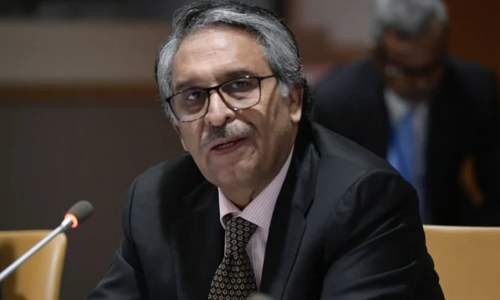ISLAMABAD: The Caretaker Foreign Minister of Pakistan, Jalil Abbas Jilani, reiterated that Pakistan’s stance on establishing relations with Israel would be determined by considering both Pakistan’s national interests and the interests of the Palestinian people.
This statement was made in response to comments by Israeli Foreign Minister Eli Cohen regarding the normalization of Israel’s relations with Muslim-majority nations. Cohen, as reported by Israeli media outlet Kan News, suggested that “six or seven” Islamic countries were likely to normalize ties with Israel, following the potential inclusion of Saudi Arabia in the Abraham Accords. The Abraham Accords already involved the United Arab Emirates, Bahrain, Morocco, and Sudan.
Cohen also claimed to have held meetings with leaders from several Muslim countries that have not yet recognized Israel. In response, Jalil clarified that Cohen had not recently met with any Pakistani officials.
In 2005, during the tenure of former President General Pervez Musharraf, Pakistan’s then-Foreign Minister Khurshid Mahmud Kasuri met with his Israeli counterpart Silvan Shalom in Istanbul, Turkey. This marked the first publicly known meeting of this kind, facilitated by Turkish President Recep Tayyip Erdoğan’s efforts. However, no such meetings at the foreign ministerial level or higher have been reported in the media since that time.
A senior Pakistani diplomat, speaking anonymously, expressed hope that Pakistan would not need to make a decision on this matter in the near future.
During his address at the 78th United Nations General Assembly this week, Israeli Prime Minister Benjamin Netanyahu stated that peace with Saudi Arabia would signify peace between the Muslim world and Jews. He also claimed that Israel was close to normalizing ties with Saudi Arabia while displaying maps depicting the West Bank, Gaza, and Golan Heights as part of Israel. This statement has sparked a new debate regarding which Muslim countries, following the UAE, Bahrain, Morocco, and Sudan, would establish relations with Israel.
It is worth noting that Cohen has asserted that six or seven Muslim countries, including Saudi Arabia, will soon recognize Israel. However, he did not disclose the names of these seven countries due to the situation in Libya, according to international affairs experts.
A significant diplomatic issue arose with Libya less than a month ago when Cohen’s office revealed a meeting with the then-former Foreign Minister of Libya, Najla Mangoush, in Rome. As a result, Mangoush was dismissed from her position, leading to widespread protests in North Africa. She subsequently fled to London. Following this incident, US officials criticized Cohen for disrupting communication with Libya, as reported by The Cradle.
(Islamabad_Newsdesk)














